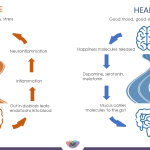
How’s your head today? Are you firing on all cylinders, or did you wake up feeling fuzzy and foggy? Have you hit the “afternoon slump” and are finding reading this blog a little bit like wading through knee-high mud?
If so, it sounds like you are experiencing a phenomenon commonly known as “brain fog.” Brain fog is a form of mental fatigue and memory impairment where you feel like your brain isn’t functioning at the same level that it normally does. And while it is extremely common to experience brain fog, especially if you’ve missed a good night’s sleep or eaten foods your body has a difficult time digesting, consistent or long-term brain fog is a crucial indicator that something else is going on in your body and shouldn’t be ignored. Let’s take a look at what brain fog is and what you can do about it.
Causes of Brain Fog
Brain fog occurs when the production and uptake of neurotransmitters (chemical messengers) in the brain are disrupted and triggered by a variety of factors. Certain medications and chronic illnesses like multiple sclerosis and Lyme disease are known to cause significant brain fog. Intermittent brain fog can be caused by lack of sleep, stress, high caffeine intake, and overeating. Brain fog can usually be eliminated by avoiding these triggers.
However, if you’ve tried getting more sleep or decreasing your stress level and you are still experiencing brain fog on the regular, it’s time to take a deeper look at what your body is trying to tell you. So, where do you start looking? Start at your gut.
One of the primary causes of long-term brain fog is poor gut health. Formed from the same tissue during fetal development, the gut and the brain are completely connected throughout life. “70% of your serotonin is made in your gut,” says Dr. Frank Lipman, author of several books on the topic. “What is going on in your gut is going to affect your mood, anxiety, depression, and focus.” So those sayings to “trust your gut” and “it’s a gut feeling” are remarkably accurate assessments of how your body processes emotions, stress, and a whole host of other physiological functions.
The gut, often referred to as the “second brain” or enteric nervous system, comprises approximately 100 million neurons- more than both our spinal cord or the peripheral nervous system. These neurons are thought to generate as much dopamine as the brain. Needless to say, we’ve been overlooking a key factor in our overall health for years, and our energy levels, memory, and ability to concentrate are suffering because of it.
Heal the Gut, Heal the Brain
If our gut is the “second brain” and so very critical to the proper physiological function of the “first brain,” how do we move it towards optimal health? The key to getting rid of brain fog for good is establishing a balanced, healthy gut flora. While there are a host of lifestyle changes that will help this process along, let’s talk about the nutritional piece of the puzzle. Here at Vitality, we recommend a three-step approach to get started on the road to healing your gut: eliminate toxins, reduce inflammation, and restore the gut flora.
1) Eliminate Toxins
Eliminating toxins in the gut starts with eliminating toxins in our diet. Following an elimination diet helps us take a systematic approach to identifying food intolerances that can cause inflammation throughout the body. Gluten, dairy, sugar, zero sugar foods, artificial sweeteners, alcohol, and other reactive foods are totally eliminated from the diet for a time. Once the body is reset and out of a reactive state, they are slowly reintroduced in order to identify food triggers.
2) Reduce Inflammation
Inflammation is our body’s natural response to toxicity. The problem arises when our lifestyle produces daily causes of inflammation, and our body remains in a constant state of reactivity. Inflammation is a factor in various chronic illnesses like heart disease, and cancer as well as brain fog. An easy way to reduce inflammation in the body is to avoid foods that cause it and add anti-inflammatory foods to your diet. The Standard American Diet (SAD) is high in inflammatory foods like processed foods, processed sugars, and high-fat foods such as dairy and red meat. Instead, focus on taking in fresh, whole fruits and vegetables, lean proteins, and whole grains.
Optimal nutrition can also help lower inflammation and promote healthy brain function. Ensure you are getting enough zinc, iron, magnesium, vitamin B6, Vitamin D3, as well as omega-three fatty acids. It is always best to obtain these nutrients from an anti-inflammatory, whole foods diet, but if you are still lacking supplementation can help.
3) Restore the Gut Flora
The microbes in your gut do more than just help your “second brain” function optimally; they also help the body fight off illnesses. But all sorts of things in our daily life throw the balance of our flora off. Processed foods, medications, stress, and environmental toxins all work to upset the healthy balance of bacteria in your system. Help restore the balance with a well-rounded variety of whole, high fiber foods and a high-quality probiotic. Fermented foods like kimchi and yogurt are rich in probiotic bacteria and help add beneficial bacteria and enzymes to your overall intestinal flora.
Brain fog is a common problem experienced by most people, but it doesn’t have to be a daily occurrence. Taking care of your “second brain” will help to make sure the rest of your body runs like a well-oiled machine.
Need more help? Our functional medicine services are here to provide you with the best diagnostics and customized care to get to the root of your brain fog. Call for a consultation today!




Recent Comments